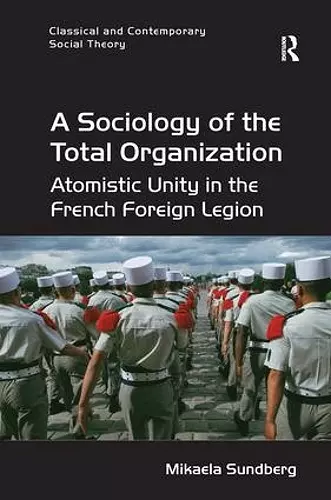A Sociology of the Total Organization
Atomistic Unity in the French Foreign Legion
Format:Paperback
Publisher:Taylor & Francis Ltd
Published:11th Jan '17
Currently unavailable, and unfortunately no date known when it will be back
This paperback is available in another edition too:
- Hardback£145.00(9781472455604)

Examining the organization of everyday life inside the regiments of the French Foreign Legion, this book takes its theoretical point of departure in the notion of the voluntary total organization; that is to say, an institution that constitutes a geographically delimited place of residence and work in which inmates are voluntarily separated from the outside world, leading an enclosed, formally administered life. Informed by a modified version of Goffman's original concept of the total institution, A Sociology of the Total Organization untangles the Foreign Legion and the ways in which different kinds of social orders interplay there. With a focus on regimental life, the author characterizes the armed forces not only as a total organization, but also as a greedy one, seeking undivided loyalty and the incorporation of all social roles within its bounds. Against this understanding, the book draws on rich ethnographic work to develop the notion of atomistic unity, the ideal relational condition that exists in the military, in which individuals commit to a unit and articulate ties with individuals on an impersonal basis, grounded in the belief in a greater whole. A detailed and empirically grounded study of the mechanisms in which the Foreign Legion not only cuts members' ties to people outside the organization, but also restricts the creation and maintenance of ties among its members, this book shows how atomistic unity is not limited to greedy organizations such as the military, but applies to a variety of collectivist settings. As such, it will appeal to scholars of sociology and anthropology with interests in military life, social relations, social theory and the work of Goffman.
'The French Foreign Legion is one of the most famous military forces in the world but up until now it has not been the subject of systematic academic attention. Mikaela Sundberg has just changed that. In a penetrating ethnography, she exposes the lifeworld of the legionnaire to critical sociological attention. The book represents a major contribution to the study of the armed forces and will be essential reading to all those interested in contemporary military transformation.' - Anthony King, University of Exeter, UK
'Sundberg's inside view of life in the Foreign Legion shows how an oppressively controlling organization generates a mystique for its own members. Her new theory of atomistic unity explains how it functions without personal solidarity and across an international diversity of ethnicities and languages, making it paradoxically one of the most global of organizations.' - Randall Collins, University of Pennsylvania, USA
'This wonderfully fascinating book is unique in combining classic and contemporary social theory with empirically rich ethnographic data. Sundberg makes a valuable contribution to organisational sociology through her concept of atomistic unity, which describes the social network of impersonal ties that unite members across hierarchical ranks. Focusing on the informal mechanisms of social control that operate through everyday life in the regimental barracks, she highlights practices of peer surveillance, interaction rituals, greedy ties and secondary adjustments, which create social solidarity and loyalty to the Legion.' - Susie Scott, University of Sussex, UK
'... a valuable and lively addition to the sociology of organizations.' - Contemporary Sociology
'... sharp ethnographic study.' - Sociologisk forskning
'The French Foreign Legion is one of the most famous military forces in the world but up until now it has not been the subject of systematic academic attention. Mikaela Sundberg has just changed that. In a penetrating ethnography, she exposes the lifeworld of the legionnaire to critical sociological attention. The book represents a major contribution to the study of the armed forces and will be essential reading to all those interested in contemporary military transformation.' - Anthony King, University of Exeter, UK
'Sundberg's inside view of life in the Foreign Legion shows how an oppressively controlling organization generates a mystique for its own members. Her new theory of atomistic unity explains how it functions without personal solidarity and across an international diversity of ethnicities and languages, making it paradoxically one of the most global of organizations.' - Randall Collins, University of Pennsylvania, USA
'This wonderfully fascinating book is unique in combining classic and contemporary social theory with empirically rich ethnographic data. Sundberg makes a valuable contribution to organisational sociology through her concept of atomistic unity, which describes the social network of impersonal ties that unite members across hierarchical ranks. Focusing on the informal mechanisms of social control that operate through everyday life in the regimental barracks, she highlights practices of peer surveillance, interaction rituals, greedy ties and secondary adjustments, which create social solidarity and loyalty to the Legion.' - Susie Scott, University of Sussex, UK
'... a valuable and lively addition to the sociology of organizations.' - Contemporary Sociology
'... sharp ethnographic study.' - Sociologisk forskning
ISBN: 9781138702073
Dimensions: unknown
Weight: 453g
256 pages